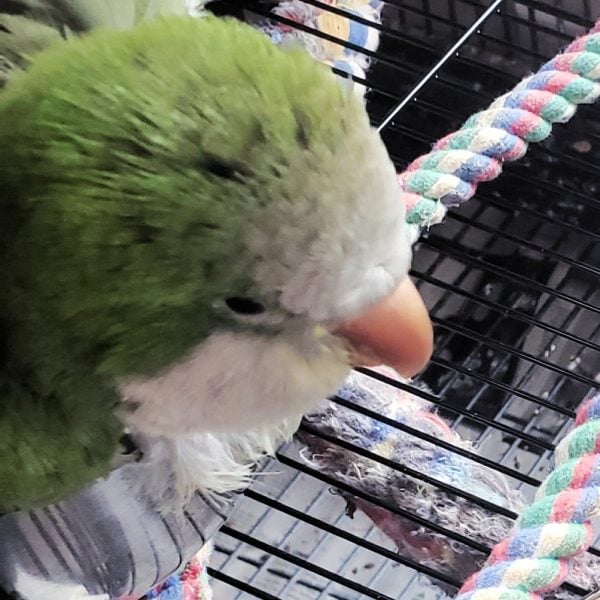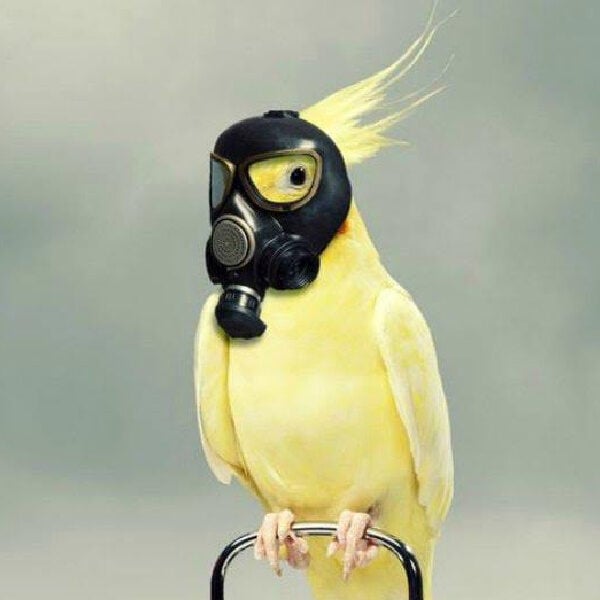Last Updated on by Mitch Rezman
Start with the Endangered Species Act from 1973
Quaker parrots are illegal to own or sell in
- California
- Georgia
- Kansas
- Kentucky
- Hawaii
- New Jersey
- Pennsylvania
- Tennessee
- Wyoming
If you live in Connecticut you can’t sell or breed a Quaker parrot but you can own one. If you live in New York and Virginia you have to register your bird with the state.
Our lawmakers feel as though they are protecting our crops and other native species of birds.
I know that crows can be big problems for farmers who may hire birds of prey to help move these invasive birds down the road.
I know a lot of falconers but I’ve never heard one say “I just got a call from a farmer who wants to move a bunch of Quaker parrots to the next farm.”
If you’re traveling with your quaker parrot across the country and you pass through states that prohibit Quakers they will give you a pass as long as the bird “leaves the state” within 48 hours.
Some states have outlawed Quakers (aka monk parakeets) outright and must be totally avoided.
When in doubt.
Find a state veterinarian office, call 1-800-545-USDA and press option “2, or visit the U.S.D.A. website and click on the appropriate state.
It’s important to check the ESA (Endangered Species Act) list that may totally outlaw your parrot including transportation through a particular state.
Blue-Headed Macaws, Lear’s macaws, Spix macaws, and Blue Throated Macaws, are currently banned and we can expect in the near future for the list to include Hyacinth macaws, Buffon’s macaws, (a subspecies of Scarlet macaws, and Military Macaws.
Expect more species in the future.
Please visit the ESA for more info
Per Wikipedia: The ESA is administered by two federal agencies, the United States Fish and Wildlife Service (FWS) and the National Oceanic and Atmospheric Administration (NOAA) (which includes the National Marine Fisheries Service, or NMFS).
NOAA handles marine species, and the FWS has responsibility for freshwater fish and all other species.
Species that occur in both habitats (e.g. sea turtles and Atlantic sturgeon) are jointly managed.
- Virginia– not safe
- Illinois – not safe
- New Hampshire –not safe
- Indiana –not safe
- Kentucky – not safe
- Oregon- not safe (take)
- Hawaii – not safe (take)
- Ohio –not safe
- Maryland- not safe
- New Jersey- not safe
NJ- The commissioner shall periodically review the State list of endangered species and may by regulation amend the list-making such additions or deletions as are deemed appropriate.
- Oklahoma – not safe
- North Carolina-not safe
- Michigan- not safe
- Kansas- not safe
- South Carolina- not safe
- Massachusetts –not safe
- Delaware – not safe
- Pennsylvania – not safe
- New York – not safe
- New Mexico –not safe
- Connecticut (?) – not safe
- Louisiana – not safe
- Mississippi – not safe
- Missouri – not safe
- South Dakota –not safe
- Montana – not safe, any species on ESA may be proposed to be added
- Nebraska – not safe
- Texas – safe
- Utah –Safe
- Alaska – safe
- California – safe
- Arizona – safe
- Alabama –safe
- North Dakota- safe
- Wyoming- safe
- West Virginia- safe
- Florida- safe
- Washington- safe
- Tennessee –safe
- Georgia- safe and weird
- Rhode Island – safe
- Maine – safe
- Nevada –safe
- Arkansas – safe
- Colorado – safe
- Wisconsin – safe since the federal laws say it is okay to own pets, I assume that the below also allows state residence to own pets.Possession, sale, or transportation within this state of any endangered species on the U.S. list of endangered and threatened foreign species shall not require a state permit under par. (a). (a) The department shall issue a permit, under such terms and conditions as it may prescribe by rule, authorizing the taking, exportation, transportation, or possession of any wild animal or wild plant on the list of endangered and threatened species for zoological, educational, or scientific purposes, for the propagation of such wild animals and wild plants in captivity for preservation purposes, unless such exportation, possession, transportation or taking is prohibited by any federal law or regulation, or any other law of this state.
- Minnesota – fuzzy, no endangered or threatened species no clear definition, very subjective.
- Iowa – fuzzy – safe if listed after Dec. 30, 1991
- Idaho – fuzzy, however, appears to only include state endangered species.
- Vermont –fuzzy, and looks safe though some limitations are made.
Here is something interesting I found in two state laws.
If Scarlet macaws go on the list, does this mean they can confiscate your Greenwing or hybrid and not apologize or provide restitution?
The commission may, by rule, treat any species as an endangered species or threatened species even though it is not listed pursuant to section 481B.3 if it finds that the species so closely resembles in appearance a species which is listed pursuant to section 481B.3 and that enforcement personnel would have substantial difficulty in attempting to differentiate between the listed and unlisted species, and the effect of this substantial difficulty is an additional threat to an endangered or threatened species or finds that the treatment of an unlisted species will substantially facilitate the enforcement and further the intent of this chapter.
Map of endangered species laws
Curated by Mitch Rezman
Approved by Catherine Tobsing
Your Zygodactyl Footnote
Author Profile
Latest entries
 Feeding Exotic BirdsDecember 29, 2025How to Switch or Convert Your Bird From Seeds to Pellets: Real-Life Case Studies and Practical Guidance
Feeding Exotic BirdsDecember 29, 2025How to Switch or Convert Your Bird From Seeds to Pellets: Real-Life Case Studies and Practical Guidance Feeding Exotic BirdsDecember 16, 2025A Practical, Budget-Smart Guide to Feeding Birds Well
Feeding Exotic BirdsDecember 16, 2025A Practical, Budget-Smart Guide to Feeding Birds Well Bird EnviornmentsDecember 7, 2025Understanding Budgie Cage Bar Orientation: Myths, Realities & Practical Solutions for Vertical-Bar Bird Cages
Bird EnviornmentsDecember 7, 2025Understanding Budgie Cage Bar Orientation: Myths, Realities & Practical Solutions for Vertical-Bar Bird Cages Feeding Exotic BirdsDecember 5, 2025How Dr. T.J. Lafeber Rewrote the Future of Pet Bird Nutrition
Feeding Exotic BirdsDecember 5, 2025How Dr. T.J. Lafeber Rewrote the Future of Pet Bird Nutrition




Lisa
6 Dec 2020Hi, Mitch, thanks for the article. The USDA link doesn’t bring you to a list of states, what do you click first on that page?
I’ve looked more than once and don’t understand the phrase ‘not safe’ with footnote-looking numbers in front of them. What does this refer to?